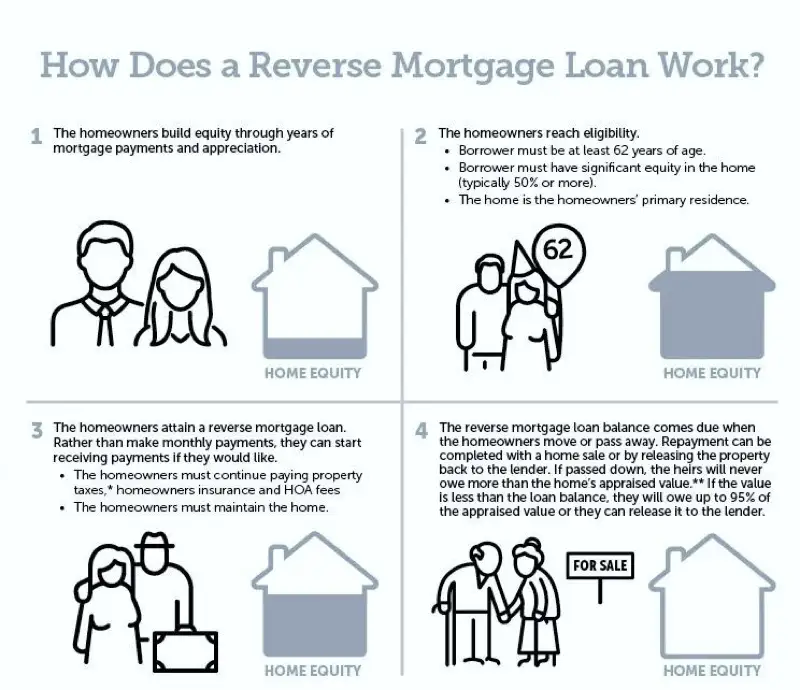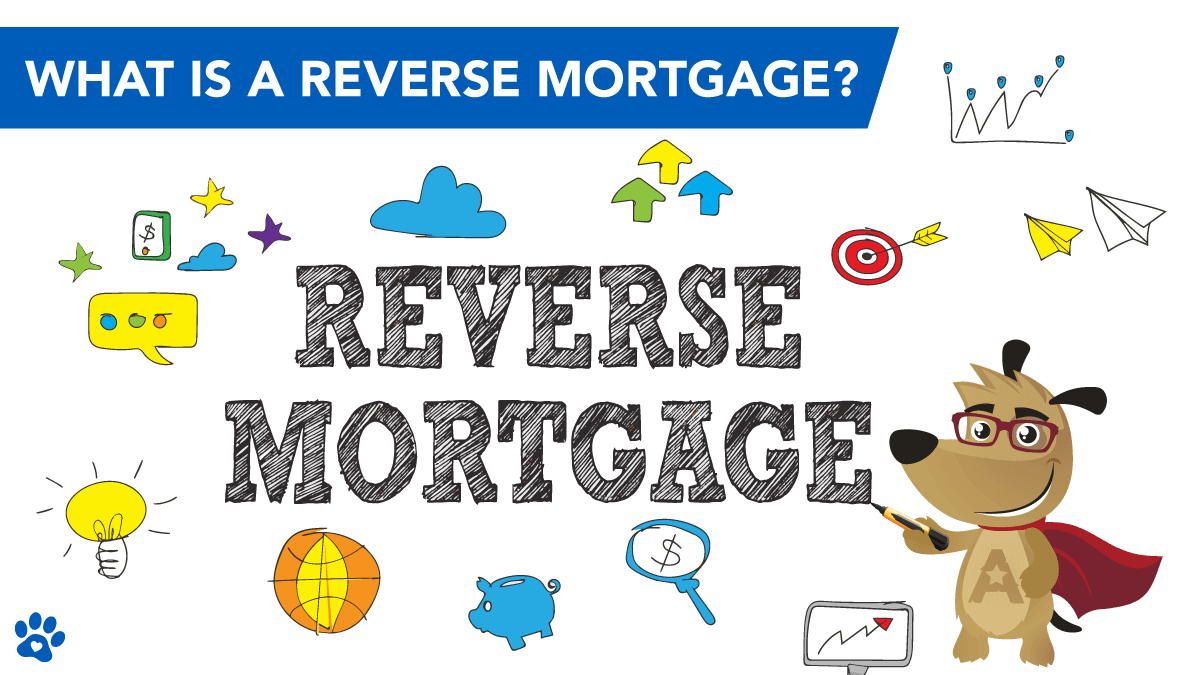Understand How to Purchase Reverse Mortgage for a Stress-Free Retirement
Understand How to Purchase Reverse Mortgage for a Stress-Free Retirement
Blog Article
Unlock Financial Freedom: Your Guide to Investing In a Reverse Home Loan
Comprehending the ins and outs of reverse home loans is crucial for home owners aged 62 and older looking for economic liberty. As you consider this alternative, it is vital to comprehend not just exactly how it works but also the implications it might have on your monetary future.
What Is a Reverse Home Loan?

The fundamental allure of a reverse mortgage lies in its possible to boost economic adaptability during retirement. Homeowners can make use of the funds for numerous objectives, including clinical expenditures, home enhancements, or daily living costs, thus providing a safety and security web throughout a critical point of life.
It is vital to comprehend that while a reverse home mortgage permits boosted capital, it likewise reduces the equity in the home with time. As interest builds up on the superior finance equilibrium, it is essential for potential debtors to meticulously consider their long-term monetary plans. Consulting with an economic consultant or a reverse mortgage expert can provide useful insights right into whether this option aligns with an individual's economic goals and conditions.
Qualification Needs
Understanding the qualification needs for a reverse home mortgage is vital for property owners considering this financial option. To qualify, applicants must go to the very least 62 years of ages, as this age requirement enables seniors to access home equity without monthly home mortgage settlements. Furthermore, the house owner must occupy the residence as their key residence, which can consist of single-family homes, specific condominiums, and made homes fulfilling certain guidelines.
Equity in the home is an additional crucial need; house owners typically need to have a substantial amount of equity, which can be determined via an evaluation. The amount of equity readily available will straight influence the reverse home mortgage quantity. Applicants must show the capability to preserve the home, consisting of covering residential property taxes, property owners insurance, and upkeep expenses, making certain the residential or commercial property stays in good condition.
In addition, prospective borrowers need to go through a financial evaluation to evaluate their revenue, credit report, and overall financial circumstance. This analysis assists loan providers establish the candidate's capacity to meet ongoing commitments associated with the home. Fulfilling these needs is important for securing a reverse home loan and making sure a smooth economic transition.
Benefits of Reverse Home Mortgages
Countless advantages make reverse mortgages an appealing option for senior citizens seeking to improve their economic adaptability. purchase reverse mortgage. Among the key advantages is the capability to convert home equity into money without the requirement for regular monthly home loan repayments. This function enables senior citizens to gain access to funds for different requirements, such as clinical costs, home enhancements, or daily living expenses, thus minimizing monetary tension
Additionally, reverse mortgages provide a safety web; seniors can remain to stay in their homes for as lengthy as they satisfy the funding demands, fostering stability throughout retirement. The proceeds from a reverse mortgage can additionally be made use of to postpone Social Safety benefits, possibly causing higher payments later on.
Additionally, reverse mortgages are non-recourse loans, suggesting that debtors will never ever owe even more than the home's value at the time of sale, protecting them and their beneficiaries from financial responsibility. The funds gotten from a reverse More Info home mortgage are normally tax-free, adding one more layer of financial alleviation. Overall, these advantages position reverse mortgages as Read More Here a sensible service for elders seeking to enhance their financial situation while keeping their treasured home environment.

Costs and Charges Involved
When thinking about a reverse home mortgage, it's vital to know the various costs and charges that can affect the general economic image. Understanding these costs is vital for making an educated choice concerning whether this financial product is best for you.
One of the main expenses related to a reverse home mortgage is the source cost, which can differ by lender but typically ranges from 0.5% to 2% of the home's appraised value. Furthermore, property owners must expect closing expenses, which might include title insurance coverage, evaluation charges, and debt record costs, commonly totaling up to numerous thousand bucks.
One more considerable cost is mortgage insurance premiums (MIP), which shield the lending institution versus losses. This charge is typically 2% of the home's value at closing, with an ongoing yearly costs of 0.5% of the staying car loan balance.
Lastly, it is very important to take into consideration recurring costs, such as residential or commercial property taxes, home owner's insurance policy, and maintenance, as the borrower continues to be in charge of these costs. By carefully reviewing these costs and expenses, property owners can much better evaluate the economic important source ramifications of pursuing a reverse home mortgage.
Steps to Start
Getting going with a reverse mortgage includes numerous essential actions that can assist streamline the procedure and guarantee you make informed choices. Initially, evaluate your economic situation and figure out if a reverse home mortgage lines up with your lasting objectives. This includes reviewing your home equity, current financial obligations, and the need for added income.
Next, research study numerous lenders and their offerings. Search for reliable organizations with favorable testimonials, clear fee structures, and competitive rates of interest. It's necessary to compare conditions and terms to discover the most effective suitable for your requirements.
After picking a lending institution, you'll require to finish a detailed application process, which generally needs paperwork of earnings, possessions, and building information. Involve in a therapy session with a HUD-approved therapist, that will supply insights into the ramifications and responsibilities of a reverse mortgage.
Verdict
To conclude, reverse home mortgages provide a viable option for elders looking for to improve their monetary stability throughout retired life. By converting home equity into accessible funds, home owners aged 62 and older can resolve numerous monetary needs without the pressure of month-to-month payments. Comprehending the intricacies of qualification, advantages, and connected costs is essential for making educated decisions. Careful factor to consider and planning can lead to better lifestyle, guaranteeing that retirement years are both safe and satisfying.
Comprehending the intricacies of reverse home mortgages is important for home owners aged 62 and older seeking economic freedom.A reverse mortgage is an economic product created primarily for house owners aged 62 and older, permitting them to convert a section of their home equity right into money - purchase reverse mortgage. Consulting with an economic consultant or a reverse home loan professional can give important understandings right into whether this option lines up with a person's economic goals and situations
In addition, reverse mortgages are non-recourse fundings, suggesting that borrowers will never owe even more than the home's worth at the time of sale, securing them and their successors from economic liability. In general, these benefits setting reverse home loans as a sensible remedy for seniors seeking to improve their financial circumstance while preserving their treasured home atmosphere.
Report this page